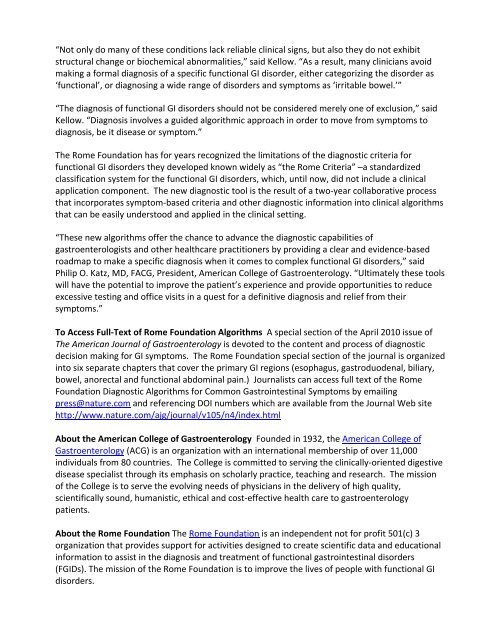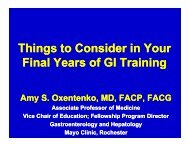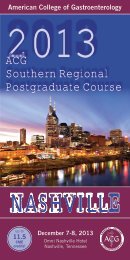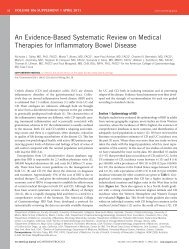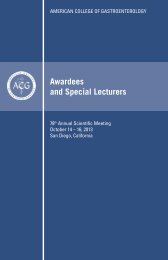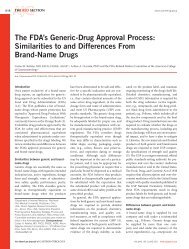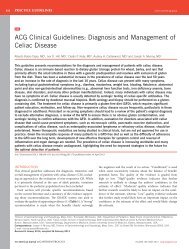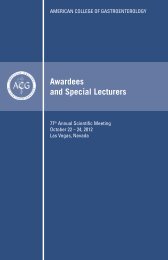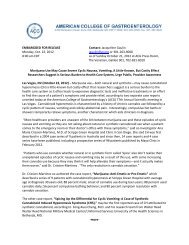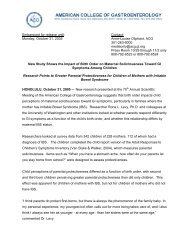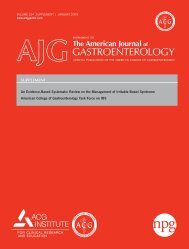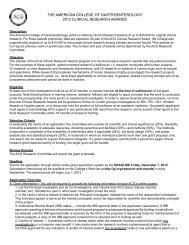Rome Foundation Introduces New Clinical Tool for Diagnosis of ...
Rome Foundation Introduces New Clinical Tool for Diagnosis of ...
Rome Foundation Introduces New Clinical Tool for Diagnosis of ...
You also want an ePaper? Increase the reach of your titles
YUMPU automatically turns print PDFs into web optimized ePapers that Google loves.
“Not only do many <strong>of</strong> these conditions lack reliable clinical signs, but also they do not exhibit<br />
structural change or biochemical abnormalities,” said Kellow. “As a result, many clinicians avoid<br />
making a <strong>for</strong>mal diagnosis <strong>of</strong> a specific functional GI disorder, either categorizing the disorder as<br />
‘functional’, or diagnosing a wide range <strong>of</strong> disorders and symptoms as ‘irritable bowel.’”<br />
“The diagnosis <strong>of</strong> functional GI disorders should not be considered merely one <strong>of</strong> exclusion,” said<br />
Kellow. “<strong>Diagnosis</strong> involves a guided algorithmic approach in order to move from symptoms to<br />
diagnosis, be it disease or symptom.”<br />
The <strong>Rome</strong> <strong>Foundation</strong> has <strong>for</strong> years recognized the limitations <strong>of</strong> the diagnostic criteria <strong>for</strong><br />
functional GI disorders they developed known widely as “the <strong>Rome</strong> Criteria” –a standardized<br />
classification system <strong>for</strong> the functional GI disorders, which, until now, did not include a clinical<br />
application component. The new diagnostic tool is the result <strong>of</strong> a two‐year collaborative process<br />
that incorporates symptom‐based criteria and other diagnostic in<strong>for</strong>mation into clinical algorithms<br />
that can be easily understood and applied in the clinical setting.<br />
“These new algorithms <strong>of</strong>fer the chance to advance the diagnostic capabilities <strong>of</strong><br />
gastroenterologists and other healthcare practitioners by providing a clear and evidence‐based<br />
roadmap to make a specific diagnosis when it comes to complex functional GI disorders,” said<br />
Philip O. Katz, MD, FACG, President, American College <strong>of</strong> Gastroenterology. “Ultimately these tools<br />
will have the potential to improve the patient’s experience and provide opportunities to reduce<br />
excessive testing and <strong>of</strong>fice visits in a quest <strong>for</strong> a definitive diagnosis and relief from their<br />
symptoms.”<br />
To Access Full‐Text <strong>of</strong> <strong>Rome</strong> <strong>Foundation</strong> Algorithms A special section <strong>of</strong> the April 2010 issue <strong>of</strong><br />
The American Journal <strong>of</strong> Gastroenterology is devoted to the content and process <strong>of</strong> diagnostic<br />
decision making <strong>for</strong> GI symptoms. The <strong>Rome</strong> <strong>Foundation</strong> special section <strong>of</strong> the journal is organized<br />
into six separate chapters that cover the primary GI regions (esophagus, gastroduodenal, biliary,<br />
bowel, anorectal and functional abdominal pain.) Journalists can access full text <strong>of</strong> the <strong>Rome</strong><br />
<strong>Foundation</strong> Diagnostic Algorithms <strong>for</strong> Common Gastrointestinal Symptoms by emailing<br />
press@nature.com and referencing DOI numbers which are available from the Journal Web site<br />
http://www.nature.com/ajg/journal/v105/n4/index.html<br />
About the American College <strong>of</strong> Gastroenterology Founded in 1932, the American College <strong>of</strong><br />
Gastroenterology (ACG) is an organization with an international membership <strong>of</strong> over 11,000<br />
individuals from 80 countries. The College is committed to serving the clinically‐oriented digestive<br />
disease specialist through its emphasis on scholarly practice, teaching and research. The mission<br />
<strong>of</strong> the College is to serve the evolving needs <strong>of</strong> physicians in the delivery <strong>of</strong> high quality,<br />
scientifically sound, humanistic, ethical and cost‐effective health care to gastroenterology<br />
patients.<br />
About the <strong>Rome</strong> <strong>Foundation</strong> The <strong>Rome</strong> <strong>Foundation</strong> is an independent not <strong>for</strong> pr<strong>of</strong>it 501(c) 3<br />
organization that provides support <strong>for</strong> activities designed to create scientific data and educational<br />
in<strong>for</strong>mation to assist in the diagnosis and treatment <strong>of</strong> functional gastrointestinal disorders<br />
(FGIDs). The mission <strong>of</strong> the <strong>Rome</strong> <strong>Foundation</strong> is to improve the lives <strong>of</strong> people with functional GI<br />
disorders.


